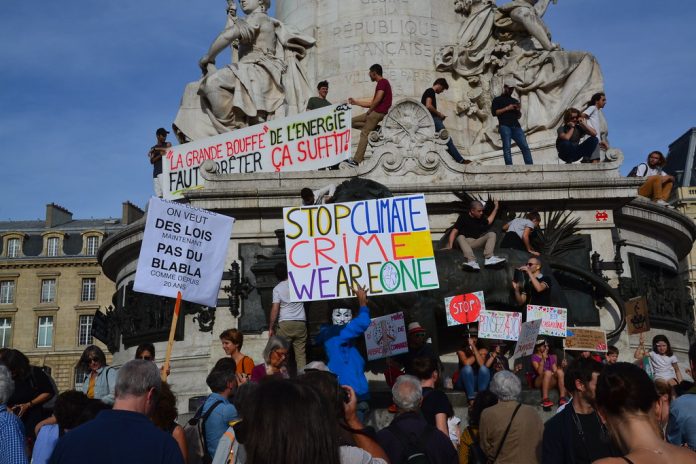Humans are probably causing some of the warming of the Earth’s atmosphere, but substantial disagreement exists between scientists on the expected impacts from climate change.
ARLINGTON HEIGHTS, IL (November 8, 2022) – A new poll of scientists conducted by Fairleigh Dickinson University found that only 59 percent of respondents think global climate change will cause “significant harm” to the “living conditions for people alive today.”
That is far short of the “97 percent consensus” narrative pushed by climate alarmists and their media allies across the globe.
The survey, conducted in September and October 2022 by Fairleigh Dickinson University and commissioned by The Heartland Institute, polled only professionals and academics who held at least a bachelor’s degree in the fields of meteorology, climatology, physics, geology, and hydrology.
The key question of the survey asked: “In your judgement, what will be the overall impact of global climate change on living conditions for people alive today, across the globe?” Fifty-nine percent said “significant harm.” Thirty-nine percent said either “significant improvement,” “slight improvement,” “no change,” or “slight harm.” Two percent were not sure.
Among respondents with the most experience – those at least 50-years-old – less than half expect significant harm for people alive today. Scientists 30-years-old and younger were the only age group for which more than 60 percent expect significant harm.
Like prior surveys of scientists, the new poll shows the vast majority of scientists agree the planet is warming. On average, respondents attributed 75 percent of recent warming to human activity. More importantly, scientists disagree among themselves on whether future warming will be much of a problem.
The poll also found only 41 percent of respondents believe there has been a significant increase in the frequency of severe weather events. The majority say there has been no change or only a slight increase.
In reality, objective data shows hurricanes, tornadoes, wildfires, drought, and other extreme weather events have become less frequent in recent decades.
“The scientific method requires that we engage in science by testing and analyzing theories according to objective data rather than asking for a show of hands,” said James Taylor, president of The Heartland Institute, who speaks often in the media and in testimony before legislators. “However, to the extent people are curious about what other scientists believe, there is substantial disagreement among scientists themselves regarding whether climate change poses serious threats, or even merely significant ones.
“This newest survey destroys the oft-repeated propaganda that 97 percent of the world’s scientists believe climate change is a serious problem requiring immediate action,” Taylor added.
“While the media and climate advocates claim that there is a ‘97 percent consensus’ on climate change, this poll illustrates that there is less consensus and a broader scope of differing opinion,” said Heartland Institute Senior Fellow Anthony Watts. “Climate change is almost always framed as something bad, this poll finds 30 percent said climate change will produce only ‘slight harm’ to our standard of living and eight percent stated they believe our standard of living will improve or remain unchanged due to climate change.
“Just 44 percent of scientists over 50-years-old believe climate change will reduce our standard of living in our lifetimes,” Watts added. “Further, they were unconvinced that severe weather events have increased, at just 38 percent. The results suggest that the draconian solutions such as net-zero being pushed by the left, even if they actually worked, are aimed at a non-problem.”
“This survey, once again, explodes the myth that 97 percent of climate scientists believe humans are causing catastrophic climate change,” said H. Sterling Burnett, director of the Arthur B. Robinson Center on Climate and Environmental Policy at The Heartland Institute. “Although, on average, most respondents attributed 75 percent of recent warming to human activity, nearly 40 percent of those surveyed said they believe climate change will cause only slight harm, no harm, or even improve living conditions.
“So, climate change? Yes. Humans responsible for most of it? The poll says, ‘yes.’ Catastrophe? No agreement,” Burnett said. “Interestingly, it seems the more experience one has as a researcher the more skeptical one becomes of extreme climate claims, with less than half of those surveyed who were 50 or older believing either that humans were responsible for the vast majority of climate change or that climate change threatens significant harm to those living today.
“It seems, years of indoctrination have succeeded in brain washing younger, less experienced climate scientists into believing, data to the contrary, that humans are causing a climate catastrophe,” Burnett added.
“This survey shows that, at least among those surveyed, there is a correct consensus belief that the Earth’s climate does in fact change, but it’s clear that the science on attribution to human causes, or the severity of impact, is not quite settled,” said Heartland Institute Research Fellow Linnea Lueken. “This is good news, and there should be a robust and enthusiastic debate without fear of losing funding or career prospects; no perspective can be ignored outright without testing. It is particularly notable that some scientists surveyed believe that there are increases in extreme weather events like hurricanes, despite the fact that data show that is not the case.
“To me, this result indicates that many opinions are being influenced not by scientific data, but by sensationalist media coverage,” Lueken added. “Scientists are, after all, human like the rest of us, and are just as susceptible to bias and non-scientific propaganda as anyone else.”
For more great content from Environment & Climate News.
For more from The Heartland Institute.


























